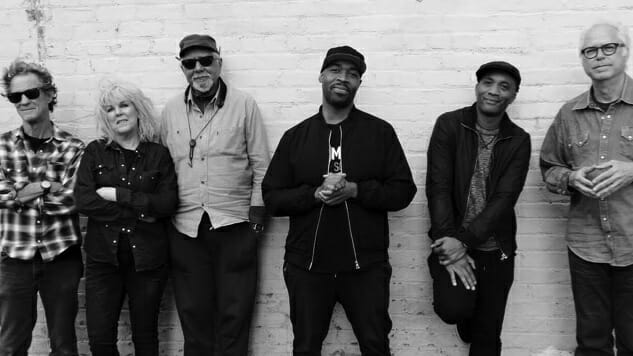The 10 Best Roots & Blues Albums of 2018
Photo by D. Darr
The first rock ’n’ roll records were a kind of hopped-up blues, and the same is usually true of the best rock ’n’ roll records today. Whether it was young white kids such as Elvis Presley and Jerry Lee Lewis following the example of Howlin’ Wolf and Ike Turner at Sun Records in Memphis or young black kids like Chuck Berry and Bo Diddley following the example of Wolf and Muddy Waters at Chess Records in Chicago, rock ’n’ roll worked best when it combined the working-class fundamentals of the blues with the upwardly mobile ambitions of refusing all limitations.
Ever since, the challenge has always been the same: How do you hold on to those roots, while stretching for new possibilities? Bob Dylan reached for new verbal possibilities and Paul McCartney for new harmonic possibilities, but they never lost contact with the blues, and that’s why their music endures. Those who stretched too far and lost that blues connection (Phil Ochs, Tim Buckley, Pink Floyd, the Moody Blues) have proven less enduring. The 2018 albums that are most likely to be remembered in 30 years are those that find ways of duplicating that Dylan/McCartney trick of combining the oldest basics of American music with something new and personal.
 10. Cedric Burnside: Benton County Relic
10. Cedric Burnside: Benton County Relic
Cedric was the grandson and drummer for R.L. Burnside until that Mississippi blues giant died in 2005. Like his friends in the North Mississippi Allstars, Cedric knows how to stay inside the hypnotic grooves, stabbing guitars and droning two-chord vamps of the Mississippi Hill Country without diluting its power with needless “improvements.” As both a singer and rhythm master, Cedric is always locked in and never fussy. For this album he has written the kind of catchy new songs this most African of American musics needs if it is to survive the death of his grandfather and Junior Kimbrough.
 9. Shemekia Copeland: America’s Child
9. Shemekia Copeland: America’s Child
Shemekia is the daughter of Texas blues legend Johnny Copeland, and she launched her career by crafting a northern-soul version of her daddy’s music. On her last two albums, however, she has applied that big-lunged, big-funk blues sound to some of the best songwriters in Nashville. On this album, she fleshes out the possibilities of songs by Mary Gauthier, John Prine, Oliver Wood and Kevin Gordon. This is the best of both worlds: terrific literary songwriting coupled with a tradition older than any college curriculum.
 8. Dave Alvin & Jimmie Dale Gilmore: Downey to Lubbock
8. Dave Alvin & Jimmie Dale Gilmore: Downey to Lubbock
The title track from this album makes the connection between the SoCal blue-collar town of Downey where the Blasters’ Alvin grew up to the West Texas cotton town of Lubbock where the Flatlanders grew up. The I-10 interstate that links the two never gets far from the Mexican border, and it pulls together two kinds of blues: the troubadour blues of Texas’s Lightnin’ Hopkins and the jump blues of California’s Johnny Otis. When Alvin and Gilmore hit the road as a duo act, they soon discovered the blues were the glue they needed, and they were soon convinced that their different takes on a shared music were too good not to record. They were right. The roughened texture of Alvin’s baritone and the purity of Gilmore’s tenor complement each other perfectly.
 7. Lonnie Holley: Mith
7. Lonnie Holley: Mith
This may well be the closest thing we’ll ever get to a sequel to Van Morrison’s Astral Weeks. Like the Irishman’s masterpiece, this one involves a big-throated singer working the same blues phrases over and over again, insistently looking for another way to handle the same words in free-form fashion over jazz musicians and chamber-music reverie. In this case, however, the vocalist is an Alabama outsider artist collected by museums and acclaimed for his visionary refashionings of found objects. He achieves a similar effect with these intuitive musical performances, reflecting America’s racial tensions back on itself as if beamed from outer space by Holley’s fellow Birminghaman Sun Ra.
-

-

-

-

-

-

-

-

-

-

-

-

-

-

-

-

-

-

-

-

-

-

-

-

-

-

-

-

-

-

-

-

-

-

-

-

-

-

-

-

 6. Charley Crockett: Lonesome as a Shadow
6. Charley Crockett: Lonesome as a Shadow 5. Robbie Fulks & Linda Gail Lewis: Wild! Wild! Wild!
5. Robbie Fulks & Linda Gail Lewis: Wild! Wild! Wild! 4. Alejandro Escovedo & Don Antonio: The Crossing
4. Alejandro Escovedo & Don Antonio: The Crossing 3. Bettye LaVette: Things Have Changed
3. Bettye LaVette: Things Have Changed 2. Kevin Gordon: Tilt & Shine
2. Kevin Gordon: Tilt & Shine 1. Charles Lloyd & the Marvels + Lucinda Williams: Vanished Gardens
1. Charles Lloyd & the Marvels + Lucinda Williams: Vanished Gardens






































